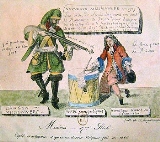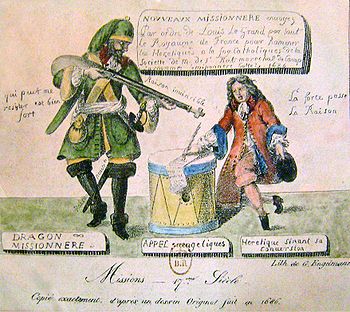
Dragonnade
Encyclopedia

Louis XIV of France
Louis XIV , known as Louis the Great or the Sun King , was a Bourbon monarch who ruled as King of France and Navarre. His reign, from 1643 to his death in 1715, began at the age of four and lasted seventy-two years, three months, and eighteen days...
in 1681 to intimidate Huguenot
Huguenot
The Huguenots were members of the Protestant Reformed Church of France during the 16th and 17th centuries. Since the 17th century, people who formerly would have been called Huguenots have instead simply been called French Protestants, a title suggested by their German co-religionists, the...
families into either leaving France or re-converting to Catholicism
Catholicism
Catholicism is a broad term for the body of the Catholic faith, its theologies and doctrines, its liturgical, ethical, spiritual, and behavioral characteristics, as well as a religious people as a whole....
.
History
This policy involved billeting ill-disciplined dragoonDragoon
The word dragoon originally meant mounted infantry, who were trained in horse riding as well as infantry fighting skills. However, usage altered over time and during the 18th century, dragoons evolved into conventional light cavalry units and personnel...
s in Protestant households. With the revocation of the Edict of Nantes in 1685, Louis XIV withdrew the privileges and toleration that Protestant Huguenots in France had been guaranteed under the edict for nearly 87 years, and ordered the destruction of Huguenot churches and the closure of Huguenot schools.
With the edict revoking religious toleration, Louis XIV combined legal persecution with the policy of terrorising recalcitrant Huguenots who refused to convert to Catholicism by billeting dragoons in their homes and instructing the soldiers to harass and intimidate the occupants to persuade them to either convert to the state religion or to emigrate. As mounted infantry, the 14 regiments of dragoons in the French Army of the period were sometimes used for what would now be called internal security
Internal security
Internal security, or IS, is the act of keeping peace within the borders of a sovereign state or other self-governing territories. generally by upholding the national law and defending against internal security threats...
duties and were an effective instrument for persecuting the Huguenots.
Marillac
The application of selective and coercive troop quartering had been initiated by the intendant René de Marillac in PoitouPoitou
Poitou was a province of west-central France whose capital city was Poitiers.The region of Poitou was called Thifalia in the sixth century....
, in 1681. With the permission of Louvois
Louvois
Louvois may refer to:* François-Michel le Tellier, Marquis de Louvois , French Secretary of State for War, commonly referred to as "Louvois"* Camille le Tellier de Louvois , French clergyman, son of the marquis...
, Marillac systematically lodged troops with Protestants, in the expectation that the existing law exempting newly-converted from this practice would spur conversions. Billetted troops got so far out of hand that, after a series of reprimands in letters, Louvois was forced to recall Marillac from Poitou.
Reaction
This persecution of Protestants caused outrage in EnglandEngland
England is a country that is part of the United Kingdom. It shares land borders with Scotland to the north and Wales to the west; the Irish Sea is to the north west, the Celtic Sea to the south west, with the North Sea to the east and the English Channel to the south separating it from continental...
and created a wave of literature in protest against the inhuman treatment of Huguenots, thousands of whom fled to England to seek asylum. The dragonnades policy caused Protestants to flee France even before the religious rights granted them by the Edict of Nantes
Edict of Nantes
The Edict of Nantes, issued on 13 April 1598, by Henry IV of France, granted the Calvinist Protestants of France substantial rights in a nation still considered essentially Catholic. In the Edict, Henry aimed primarily to promote civil unity...
were removed in 1685. Most Huguenots fled to countries such as Switzerland
Switzerland
Switzerland name of one of the Swiss cantons. ; ; ; or ), in its full name the Swiss Confederation , is a federal republic consisting of 26 cantons, with Bern as the seat of the federal authorities. The country is situated in Western Europe,Or Central Europe depending on the definition....
, the Netherlands
Netherlands
The Netherlands is a constituent country of the Kingdom of the Netherlands, located mainly in North-West Europe and with several islands in the Caribbean. Mainland Netherlands borders the North Sea to the north and west, Belgium to the south, and Germany to the east, and shares maritime borders...
, England, and the German territories.
Outcome
On January 17, 1686, Louis XIV claimed the Protestant population of 800,000-900,000, had been reduced to 1,000–1,500 in France. However, the campaign turned out to be detrimental to France's economy because the Huguenots who chose to flee possessed skills such as silkweaving, clock-making, and optometryOptometry
Optometry is a health care profession concerned with eyes and related structures, as well as vision, visual systems, and vision information processing in humans. Optometrists, or Doctors of Optometry, are state licensed medical professionals trained to prescribe and fit lenses to improve vision,...
, and became a valuable addition to the economy of the countries to which they fled.
See also
- French Wars of ReligionFrench Wars of ReligionThe French Wars of Religion is the name given to a period of civil infighting and military operations, primarily fought between French Catholics and Protestants . The conflict involved the factional disputes between the aristocratic houses of France, such as the House of Bourbon and House of Guise...
- Religions in France
- CamisardCamisardCamisards were French Protestants of the rugged and isolated Cevennes region of south-central France, who raised an insurrection against the persecutions which followed the revocation of the Edict of Nantes in 1685...
- Persecution of Huguenots under Louis XVPersecution of Huguenots under Louis XVThe persecution of Huguenots under Louis XV refers to hostile activities against French Protestants between 1724 and 1764 during the reign of Louis XV.-Under previous kings:...

